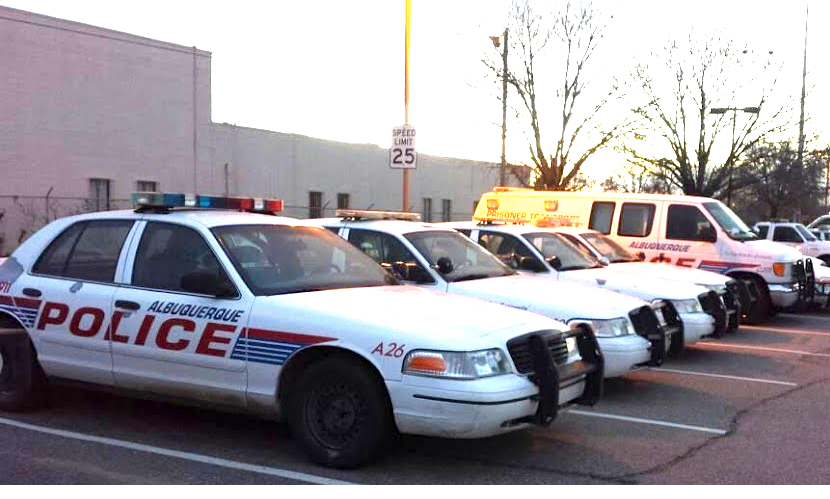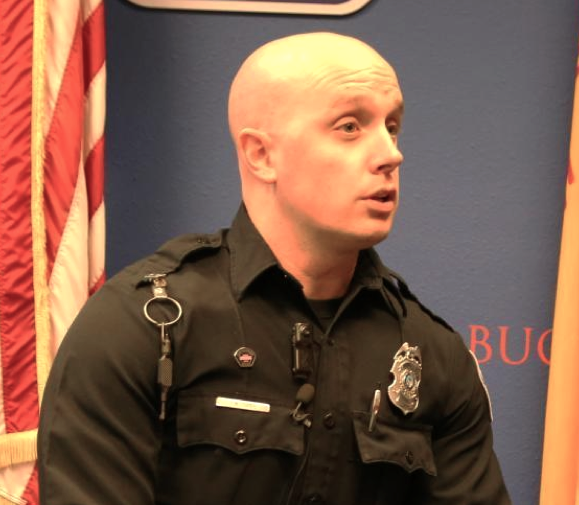[vc_row][vc_column width=”1/1″][text_output]
ANSWERED QUESTION
New project offers peer counseling to APD officers

As part of our Curious New Mexico project, we received a question asking if Albuquerque Police Department officers are offered social and psychological services in the event of a traumatic situation. News Port reporters Jaclyn Younger, Kira Trujillo, and Cameron New talked to an officer involved in a 2010 shooting, a leading doctor in the field of police psychology, and a mediator between officers and community members.
These are tense days for Albuquerque police officers, as APD is bound by a federal agreement to change its ways, including its excessive use of force.
(See Department of Justice (DOJ) investigation and district court case settlement.)
While the major points in the agreement include better training and closer oversight, there’s also a mostly overlooked strategy that takes into account the psychological health of the officers.
According to the settlement agreement, there is an assurance that all officers who are in need of psychological or social services will be provided with such support. This also means that officers who undergo a mental health evaluation will receive a screening before returning to the line of duty.
APD Detective Joshua David Brown was involved in a fatal shooting while on duty in August of 2010. For him, cultural expectations of the police department make it difficult for many officers to express their emotional and psychological state following traumatic situations. Brown said that while he did attend counseling provided by APD, he did not find it beneficial because he could not establish the trust between himself and the police psychologist working with him.
“I’m afraid to essentially tell somebody other than psych services that I’m still dealing with this stuff,” Brown said.“It’s a fear that we all have.”
According to Brown, this fear is rooted in potential lack of understanding between police officers and the psychologists provided for APD. This is mainly due to the psychologists being trained medical professionals, most of which do not have experience in being active members of law enforcement departments.
“I think they should have people that can relate to us better,” Brown said.
APD offers psychological counseling and support through its Behavioral Sciences Division. Dr. Troy Rodgers, acting division director with 10 years of experience as a police psychologist, heads a unit of 80 contracted psychologists for the police force. Rodgers said breaking down the barrier between officers and psychologists tends to be the hardest part of the counseling process.
“Most officers are fairly guarded when it comes to mental health and psychological services,” Rodgers said. “If they have a good relationship with us, they’re much more willing to utilize us.”
Rodgers said his division works with between 100 and 200 officers per year, or about 15 to 20 percent of the force. The services generally encompass support and counseling after traumatic situations, however, everyday stresses are also issues that can be brought to the division’s attention.
For those officers, like Brown, who are reticent to share their thoughts and feelings with a department psychologist, there is now a new alternative.
Beginning this year, a peer support program is being piloted within the department for officers in need of a non-traditional form of counseling according to APD Public Information Officer Tanner Tixier.

“Right now we are actually in the process of implementing and staffing a peer support program, which I hope to become a part of,” Tixier said.
Tixier said the program is being conceived under the direction of an APD lieutenant and a sergeant. It will encompass a pool of trained officers who voluntarily serve as mentors for other officers trying to navigate problems after traumatic occurrences while in the line of duty. Tixier said that not only is the peer-support program a way for APD to become more forward thinking, but it is a way for officers to gain more benefit from counseling services.
“Basically the peer-support program is just an opportunity to get a chance to sit down and just talk with another police officer,” Tixier said.
“Another detective outside the scope of talking to a doctor, talking to a psychologist, taking the stigma away and just speaking to someone who’s done the job, who’s been in those situations.”
According to Kathleen Oweegon, a lead mediator between the department and the community at Bridges of Peace, there is now potential for community members to achieve an amount of empathy and understanding towards APD officers.
Oweegon is heading the newly formed Albuquerque Collaborative on Police Communication Relations (ACPCR), a series of voluntary public meetings giving the community a chance to raise concerns in addition to providing answers for problems between Albuquerque community members and APD. This program gives citizens the chance to voice opinions on APD as well as provide potentially realistic solutions for relations between the department and the community it operates in. She says that because of this newer public forum, the discussion on APD has opened up, some community members have begun to express their gratitude and positive attitudes towards officers and that such feelings have the potential for growth in the future.
“I think the community views will change,” Oweegon said. “Not due to the DOJ investigation, but due to the remedies.”
Tixier agrees that better communication will foster a healthy respect and awareness of what officers do.
“I think that the community should have a good understanding and a general respect for it,” Tixier said. “I don’t think they need to know the specifics; officers on a daily and nightly basis see some of the most horrendous things one could possibly imagine.”
[/text_output][/vc_column][/vc_row]